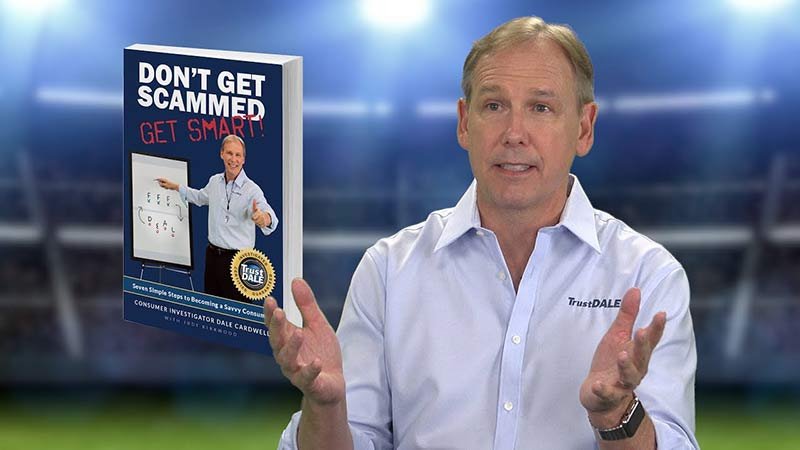Dale Investigates: Missing a Porch - UPDATE!
Aug 5, 2018 4:00 AM
Back in June, we shared with you the story of Kathy Sirko. She was at one of those big box home improvement stores and met a man who claimed to be a contractor. At the time, we wouldn’t tell you his name, but we will now. That man was Walter Davis.
When Kathy spoke to Walter, he told her that he was a contractor and could build screened-in porches. Kathy hired him, and he came to her home to give her an estimate for the project.
FIRST MISTAKE! Kathy trusted this man, but as we found out, that was a mistake. Whenever you hire someone to do work on or in your home, ask for references. Any trustworthy business should be able to provide with a list of satisfied customers as references. If they can’t, it’s time to take your business elsewhere.
Once he gave her the estimate, Kathy wrote him a check.
SECOND MISTAKE! Kathy believed that Walter would do the work and so she wrote him a check. But you should never hand over a check without getting something in return. Most reputable business owners won’t ask for payment before beginning work. In the rare instance that a business requires a down payment, get a signed contract. If you can, make the payment on a credit card, so that you have an added layer of protection to dispute the charge if the business fails to deliver.
As we now know, Walter never really intended to do the work. He took Kathy’s money and cashed the check almost immediately. But then nothing happened. Kathy kept calling, and every time she called he had an excuse. There was always a reason he couldn’t come. Eventually, Walter said he would come to drop off some materials, but he would need another check.
When Walter returned, Kathy wrote him a second check. Now she had paid him a total of $8,200. But then he stopped returning her calls. She was out $8,200 and had nothing to show for it.
That’s when she called us.
We set a sting for Walter. We called and asked Walter to come give us an estimate for an addition to a house. Walter showed up, and so did our cameras. We gave Walter a choice: he could make good on his obligation to Kathy and return her money, or we would release his name.
It looked like things were wrapping up. Walter signed an agreement to pay Kathy $500 a month over 16 months until the money was paid back in full. But Walter wasn’t done with his games.
When the due date came for the very first $500 payment, Walter was a no-show. He came up with a whole host of excuses as to why he couldn’t pay. Kathy made the decision to give him another chance. If he would pay the $500, she would let him continue with the payment plan.
Eventually, Walter paid the $500 he owed Kathy for the first payment. But thirty days later when it came time for the next payment, Walter was yet another no-show. He had excuses, but by this point, it was pretty clear that Walter didn’t intend to return the $8,200 he took from Kathy. At least not without a fight.
That’s why we are posting the name and photograph of Walter Davis, the crooked contractor who stole Kathy’s money. If he decides to return the money, we’ll make that public, too. But for now, he is on the TrustDALE Wall of Shame.

But Walter Davis isn’t alone. This is an ongoing scam with dozens or even hundreds of scammers on the prowl.
The scam is incredibly simple. Pose as a contractor. Take a payment. Disappear. It’s all based on winning and then violating the trust of good, decent people.
But the real trick of the scam is how these crooks get away with it. The trick is that instead of just breaking into your home or holding you up, these thieves dress up their theft as a business dispute. They know that if they can make their crimes look like business disputes, the police will not prosecute. Kathy reported Walter Davis to both the Cherokee and Forsyth sheriff departments. But no arrest warrant has been issued. With busy police and sheriff departments, scammers like Walter know that they are at very little risk of being prosecuted.
In conclusion, here’s how to avoid being scammed:
- Always ask for references and actually call at least one or two.
- Never sign a check without getting anything in return.
Of course, if you want to know that you are working with the most reliable and high-quality businesses, you can let Dale do the research. When you use TrustDALE certified businesses, you have the benefit of Dale’s intensive 7-point investigative review. You are also protected by the best warranties in the field as well as Dale’s Make-it-Right Guarantee™.
If you need a home contractor, start here to find a TrustDALE certified business you can trust.
ake that decision.
The Allure of Purchasing
As a construction contractor, chances are you love your tools. And what tool is more exciting than a large, expensive machine. Who doesn’t love a shiny new backhoe earth mover? But just like any other purchase, it’s important to move beyond pure emotion when you decide to purchase. This is, after all, a business investment. Before you can make any investment in your business, you need to determine if this is the right way to spend your money at this time. That doesn’t mean that there is never a situation where buying is the right decision. But it does mean that the decision to rent or to buy needs to be based on running the numbers and seeing which will be more profitable for your business. Generally, when deciding if rental might be the better option, you need to factor in a number of benefits you get from rental. Those can be compared to the possible benefits of ownership. Once you have a comparison that includes some hard numbers, you can make an informed decision about your purchase or rental.
How Long Will You Be Paying for Your Equipment
One significant difference between purchasing and renting is the payment period. When you purchase, you will be paying for that purchase for a while. Assuming you’re not purchasing your equipment with cash, you can make payments for years. When you rent, you only pay for what you use. If you end up using a piece of equipment for three or four weeks, you pay for it for three or four weeks. When you stop using it, you stop paying for it. The downside of rental is that you will continue to pay for the equipment every time you use it, even long after your purchase would have been paid off. This factor comes down to cold, hard accounting. You will need to predict how much you will really use a piece of equipment. Over the time it would take you to pay off the item, will you use it enough that the purchase price is less than the combined rental fees. Will you continue to use the item after it is paid off? How much will that save you? There is no replacement for hard numbers here. Be realistic and do the math.
Have You Considered the Benefits of Renting
There are some distinct benefits to renting equipment over buying it. First of all, you can be sure to always have the latest technology. Once you purchase equipment, it makes sense to keep it for as long as you can. That means that you are locked into the state-of-the-art at the time you purchased it. As time goes on, you will find that newer, more efficient equipment is available. If you rent, you leave it to the rental company to upgrade regularly. For rental companies, it makes sense to invest in new equipment. Every time you rent, you will get the latest and best technology. Another cost you can leave to the rental company is maintenance. If you purchase equipment, you will need to hire or train someone who can maintain and repair the equipment. Many rental agreements include routine maintenance, repairs, and even spare parts. If you read your rental agreement carefully, you can find the most beneficial programs. Leaving maintenance to the rental company can be a significant factor to consider when pricing out your purchase and rental options. If you work in more than one region, renting can be a good way to avoid shipping heavy machinery. Moving heavy machinery from region to region can be quite expensive. Often, it makes more sense to rent locally and avoid shipping altogether. Of course, for equipment you own, there is no question that it is best to ship it. But beware of shipping costs. They can take a hefty cut out of your profits and rarely have any special effects or benefits on your final project.
Keeping Your Options Open
When you buy a large piece of machinery, you are investing a lot of capital. That capital is no longer available to fund new projects and new opportunities. By renting, you only pay for the products you are using as you use them. That opens up a whole range of projects that you normally wouldn’t be able to afford.
Renting Helps Accounting
As a business owner, you probably want to keep your taxes as low as possible. Business deductions are a big part of that. So it’s worth noting the rental has a very different tax implication than purchasing. When you rent, your rental costs are immediately deductible. However, when it comes to purchasing, the tax deduction is a little more complicated. Often a purchase of rental equipment needs to be depreciated over time. Rental costs are also not considered a liability on your balance sheet. While that may sound like a somewhat technical detail, it can have significant consequences. One effect is that allows you to maintain your borrowing power.
Testing Out New Equipment
When you buy a new car, you always start with a test drive, so shouldn’t you do the same for new equipment. Purchasing new equipment may not give you that opportunity. But when you rent, you can try out any type of equipment before diving in and making a purchase. If the equipment is what you need, you can always go out and purchase it. If it’s not what you need, you can end your rental, and you’ve avoided a big investment. There are even some lease to buy programs that will let you credit your rental fees towards the purchase of the equipment if you decide you want to buy it.
When It Makes Sense to Buy
With all the advantages of renting, it may seem that renting is the way to go all the time. But there are, in fact, situations in which it makes more sense to buy. The most significant factor in whether you should rent or buy is how often you plan to use the equipment. For something you will be using day in and day out, it actually does make sense to buy it. You will get the equivalent of the rental fees back relatively quickly, and in the end, you will own it outright. A good rule of thumb is that if you will be using a piece of equipment 60 to 70 percent of the time, it’s worth buying. Of course, to really make the best decision, you will need to run the numbers. To do that, you will need to know exactly what your costs are and how that piece of equipment fits in. While you could try to dig through all your invoices and receipts, technology provides a better way. Construction management software from Needo makes it easy to maintain records of all of your costs and expenses, plus all of your revenue. Armed with that information, you can make good choices for your business. Contact Needo today to find out how Needo construction management software can help your business.


